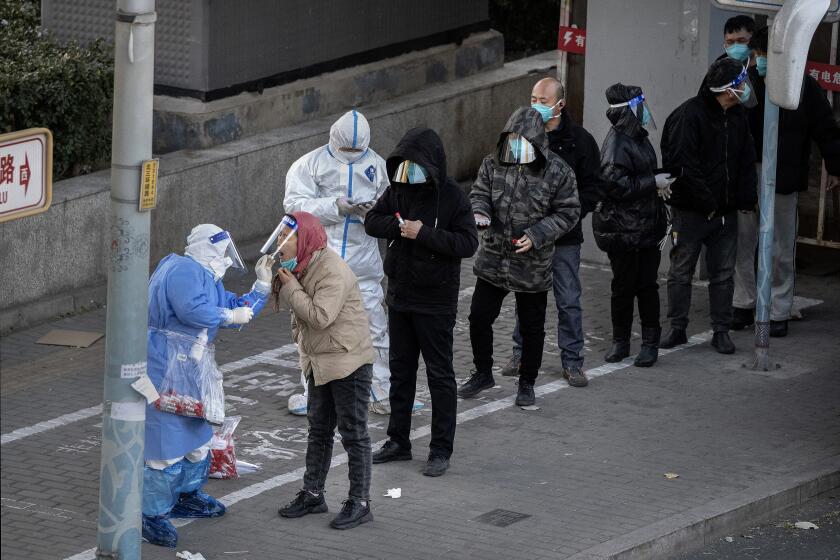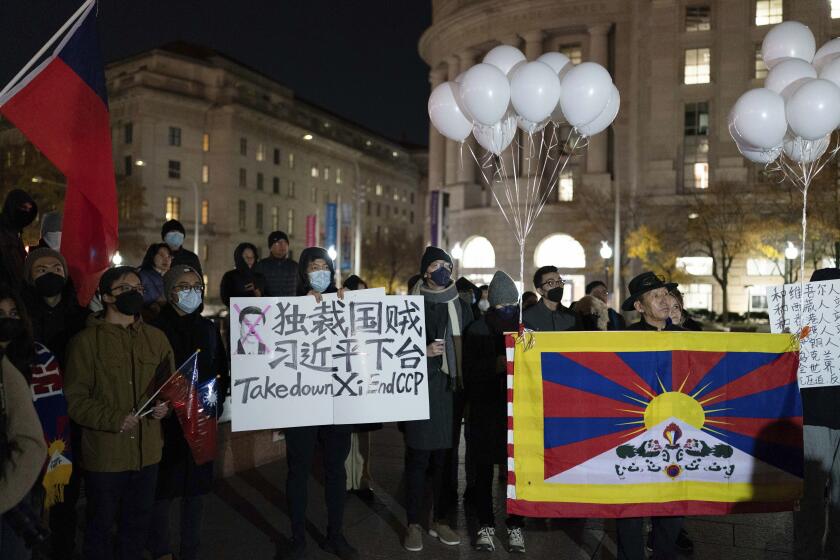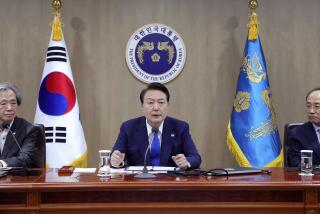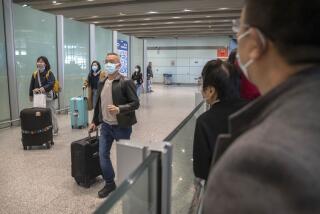China’s looser anti-COVID measures are met with relief and caution
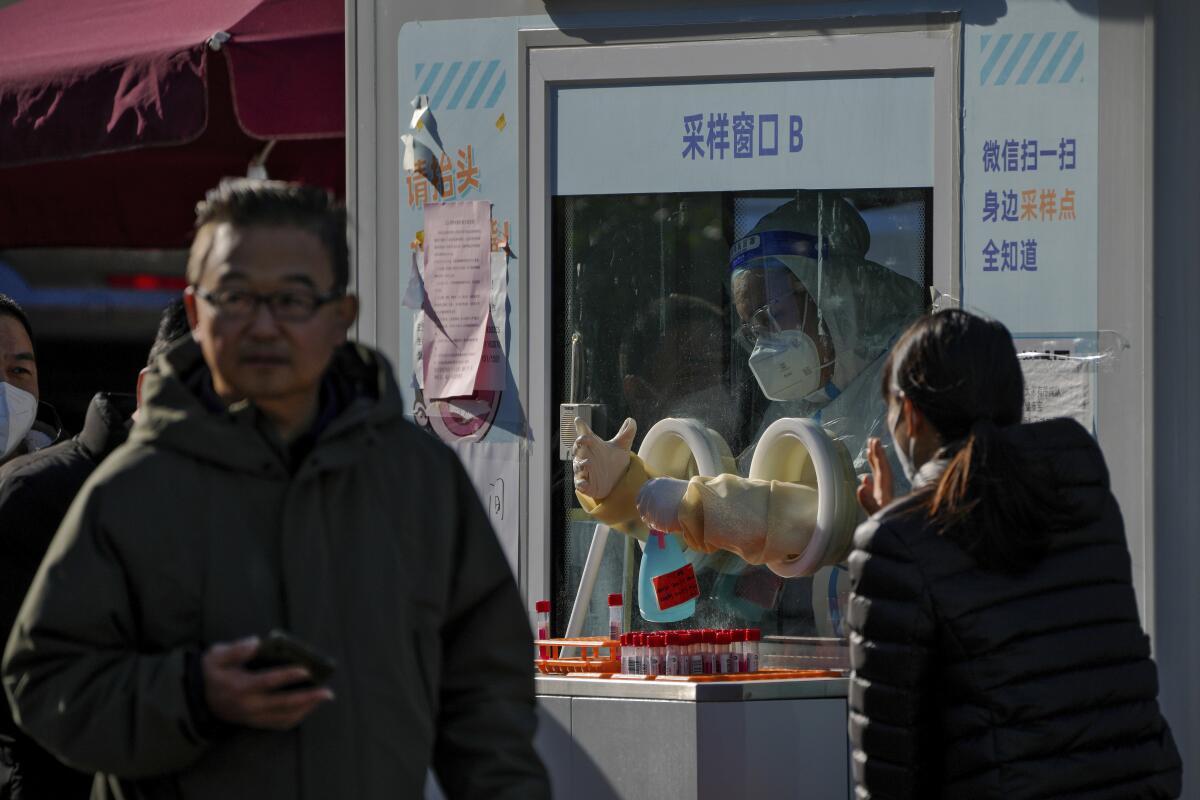
- Share via
TAIPEI, Taiwan — People across China reacted with relief and caution Thursday to the dramatic government decision to loosen some of the world’s most stringent COVID-19 restrictions.
For the first time in months, Jenny Jian hit the gym in the southern metropolis of Guangzhou without being required to scan the “health code” on her smartphone, part of a nationwide system that tracks where hundreds of millions of people go.
Elsewhere, coronavirus tests no longer were required to enter many public places under changes announced Wednesday after nationwide protests against restrictions that have confined millions of families to their homes. Schools in areas without outbreaks were ordered to reopen.
“It was implemented very quickly,” said Jian, 28. “But policy is one thing. The main thing is to see what the experience is when I step out the door.”
The changes are in line with the government’s promise to make restrictions less burdensome while still trying to contain the coronavirus. While it’s not clear if the new rules are a direct response to the protests, they address some of the most pressing issues that drove people onto the streets.
The state crackdown on the demonstrations was swift, if largely out of sight, and the flash of public anger faded from view even before the changes were announced. For now, it’s unclear whether more protests will flare, given the quickly changing situation.
First-time protesters in China grapple with how much agency they can wrest from an authoritarian government after the largest demonstrations since 1989.
Among the most significant changes announced was that people who test positive for COVID-19 but show mild or no symptoms can now stay at home — a 180-degree turn from the previous policy, which sent all infected people to government field hospitals that became notorious for overcrowding and poor food and hygiene.
Chinese officials who spent three years warning the public about COVID-19’s dangers have also begun to talk about it as less threatening — a possible effort to prepare for living with the coronavirus, as many other nations have done. On Thursday, official messaging emphasized the point, with several state media outlets sharing a lengthy explainer noting that the virus is here to stay.
“The past three years have made us not want to come in contact with the virus ... but actually in human society, there are thousands of micro-organisms,” a team working for prominent government doctor Zhang Wenhong wrote. “Inadvertently, every year we will get sick briefly because we’ve been infected by several of these.”
Still, experts were careful to underscore that this was not the end of COVID-19 containment.
Protesters in China are eager to see an easing of “zero-COVID” rules, but health experts warn that doing so could prompt a massive health emergency.
“It is not that we are going to lie flat. Precision prevention must be still adhered to,” said Yu Changping, a doctor in the department of respiratory medicine at the People’s Hospital of Wuhan University. “The opening is an irreversible trend in the future because most people have been vaccinated and there has been a lower number of serious illnesses.”
While outside experts have increasingly criticized China’s containment policy as unsustainable, they have also warned that the country will now face a challenging first wave, as the loosened measures will no doubt fuel an increase in cases. That could be particularly difficult because many elderly people are not vaccinated, and the country’s strict policies have meant few people have natural immunity against the virus.
“Every country in experiencing their first wave will face chaos, especially in medical capacity, and a squeeze on medical resources,” said Wang Pi-sheng, Taiwan’s head of COVID-19 response. Wang said Taiwanese living in China could come home for medical treatment, especially if they’re elderly or at high risk.
Bracing for the possibility of getting infected, people in the southwestern city of Chongqing rushed to buy cold and fever medicine, in line with government advice. In Beijing, some pharmacies ran out of the drugs.
Breaking News
Get breaking news, investigations, analysis and more signature journalism from the Los Angeles Times in your inbox.
You may occasionally receive promotional content from the Los Angeles Times.
Even the possibility of buying such medicine was remarkable, as the new rules relaxed restrictions on them. During the height of the pandemic, such over-the-counter medications could only be purchased through a lengthy application process, and simply visiting a pharmacy risked triggering the health code smartphone app.
But after three years of continually changing restrictions, many were cautious about rejoicing too early, wondering how the new measures would be carried out.
“All the policies are there, but when it gets to the local level, when it gets to the sub-district level, your neighborhood, it’s a complete mess,” said 65-year-old Yang Guangwei, a retiree who lives in Beijing.
The new measures also mandate fewer PCR tests, saying they must be targeted at those in high-risk industries and not entire districts. At the height of some lockdowns, many cities carried out daily tests. In recent months, Beijing and Shanghai residents had to take one every two or three days just to be able to move around the city.
An orderly end to the nation’s ostensible lockdown is China’s only path toward health or civil obedience.
One Beijing resident who gave only his family name, Qian, out of concern over discussing government policy, noted that testing is still required to access some places.
“They say don’t test, but the workplace still requires it. That’s contradictory,” Qian said of his own experience.
Underneath the official announcement of rollbacks posted on social media by state broadcaster CCTV, users expressed skepticism and noted that uncertainties abound.
One user asked if universities, many of which had prevented students from entering and leaving freely in the last few years, would return to normal. Others wondered whether certain cities would get rid of their quarantine-upon-arrival measures, as mandated in the national policies announced Wednesday.
But some expressed hope that the measures would open up new possibilities, like travel, which has been severely curtailed.
More to Read
Sign up for Essential California
The most important California stories and recommendations in your inbox every morning.
You may occasionally receive promotional content from the Los Angeles Times.

